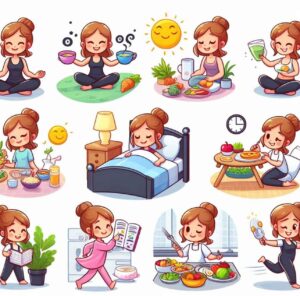Welcome Blessings!
(Tap 🔽 to see more topics!)


Life can sometimes feel like a never-ending cycle of obstacles, constantly getting in the way of your success. We all have that inner voice telling us, “You’re capable of more,” yet we struggle to tap into our true potential. What if we could break free from those barriers and start living the life we’ve always dreamed of? The key to unlocking our personal growth may be more straightforward than we think: psychology.
Psychology isn’t just for therapists or scientists. It’s a tool we can all use to understand our thoughts, improve our habits, and overcome life’s challenges. Think of psychology as a guidebook for the mind. Just like you would use a GPS to direct unfamiliar roads, it provides a roadmap for achieving our goals, building lasting habits, and fostering a mindset that propels us forward.
Suppose you want to boost your confidence, make better decisions, or improve your overall well-being. These psychological insights can help you break free from limitations and accelerate your personal growth.
You’ve probably heard the saying, “Your mindset is everything.” While it may sound cliché, there’s actual science behind this. Psychologists have long argued that your beliefs about yourself and your abilities greatly determine your success. Dr. Carol Dweck’s research on “fixed” versus “growth” mindsets demonstrates that those who embrace challenges, learn from mistakes, and see failure as part of the learning process are likelier to reach their potential.
Let’s take Thomas Edison as an example. Imagine facing thousands of failed attempts at inventing the lightbulb. What would most of us think? “I failed, I’m done.” But Edison didn’t see it that way. He saw every failure as a learning experience, saying, “I found 1,000 ways that didn’t work.” This mindset shift is what made him one of history’s greatest inventors.
Psychology Tips: The next time you encounter a challenge, ask yourself, “What can I learn from this?” Shifting your focus from the result to the growth process will help you overcome obstacles and develop a resilient mindset. By viewing failures as opportunities for learning, you’ll quickly start to see progress in areas you never thought possible.

Sometimes, the biggest obstacle to our growth is the voice inside our heads. We all have those limiting beliefs… those negative thoughts telling us, “You can’t do this,” or “You’re not good enough.” These beliefs often stem from past experiences or societal expectations, and they can hold us back without realizing it.
But the thing is psychology teaches us that we don’t have to accept these beliefs as truth. Cognitive Behavioral Therapy (CBT) is a well-known approach to overcoming limiting beliefs. It helps you identify and replace those negative thought patterns with healthier, more empowering beliefs.
Think about Oprah Winfrey. She grew up in challenging circumstances and was constantly told she wasn’t good enough. Despite this, she found the strength to challenge those beliefs and rewrite her own story. Through therapy and self-work, Oprah embraced her potential; the rest is history.
Psychology Tips: Start by writing down a limiting belief you have about yourself. Then, challenge it by asking: “Is this belief true? What evidence do I have that contradicts this?” Replacing negative beliefs with more positive and empowering ones, you’ll start to unlock your true potential.
Have you ever decided in the heat of the moment only to regret it later? Our emotions are powerful, and sometimes, they can cloud our judgment. However, psychology shows us that emotional regulation is a skill that we can learn. It’s essential for making better decisions that align with our long-term goals.
Take Steve Jobs, for example. He was known for his emotional intensity, yet he was also an emotional intelligence master. Jobs didn’t let his emotions control him. Instead, he used them to fuel his passion and drive innovation. He understood that emotional intelligence isn’t about suppressing emotions; it’s about managing them in a way that supports your goals.
Psychology Tips: The next time you face a tough decision, pause momentarily. Take a deep breath and check in with your emotions. Are you choosing based on temporary feelings or aligning it with your values and goals? Practicing mindfulness can help you stay grounded, and with emotional regulation, you’ll make better decisions moving forward.
We all know that good habits lead to success, but did you know that psychology has proven how to create habits more effectively? The science behind habit formation shows that small, consistent actions can produce massive results when repeated over time.
James Clear’s book Atomic Habits highlights the power of making minor, incremental daily improvements. Rather than overhauling your entire life all at once, focus on building tiny habits that gradually push you toward your goals. For instance, add one vegetable to your daily meal instead of overhauling your whole diet. Over time, these small steps add up, and you’ve transformed your lifestyle before you know it.

Psychology Tips: Choose one small habit you can begin today. Commit to doing it daily, whether exercising for 10 minutes, drinking more water, or reading for 15 minutes. After one week, assess how much progress you’ve made. Consistency is the key to building habits that support your personal growth.
Failure isn’t the end of the road. It’s often the beginning of something great. One of psychology’s most empowering lessons is that failure is part of the journey. The most successful people in the world have faced rejection, setbacks, and failures before finding success.
J.K. Rowling’s story is a perfect example. Before Harry Potter became a worldwide phenomenon, Rowling’s manuscript was rejected by multiple publishers. But she didn’t give up. Instead of seeing these rejections as a sign to quit, she saw them as part of her growth. Each “failure” was a lesson that led her to eventual success.
Psychology Tips: Next time you face a setback, instead of seeing it as a roadblock, ask yourself, “What can I learn from this?” Embrace the lessons failure brings and use them to grow stronger. You’re one step closer to reaching your full potential with every setback.
Have you ever imagined yourself achieving a big goal? Maybe you’ve pictured yourself giving a successful presentation, running a marathon, or landing your dream job. Visualization isn’t just daydreaming- it’s a powerful psychological tool that can help make your dreams a reality. Psychologists have long studied the effects of visualization, and research shows that it can significantly boost motivation and performance. When you visualize success, your brain activates the same areas as if you were performing the task. It’s like a mental rehearsal that primes your mind and body to act confidently.
Athletes use this technique all the time. For example, Olympic gold medalist Michael Phelps visualized his races in great detail before stepping onto the pool deck. He imagined every stroke, every turn, and every breath as though he were already swimming. This mental practice was critical in helping him perform under pressure and achieve unprecedented success.
Psychology Tips: Take five minutes daily to close your eyes and vividly imagine yourself accomplishing one of your primary goals. Visualize every detail; how it feels, what you see, and the emotions you experience. This exercise will build your confidence and prime your brain to succeed.
Most of us are our own harshest critics. We beat ourselves up over mistakes, failures, and missed opportunities. But what if we treated ourselves with the same kindness and understanding we would offer a needy friend? It is the essence of self-compassion, a proven tool for personal growth.
Psychology reveals that practicing self-compassion… not self-criticism… can improve mental health, boost resilience, and lead to tremendous success. Instead of punishing yourself for making a mistake, it encourages you to acknowledge it without judgment and treat yourself with kindness. Research by Dr. Kristin Neff shows that people who practice self-compassion are more likely to persevere through challenges and maintain a growth mindset.
Imagine you’re running a race and trip over a hurdle. If you yelled at yourself, “You’re so stupid!” you’d only feel worse. But if you say, “It’s okay, everyone stumbles. I’ll get back up and keep going,” you’ll be more likely to get back on track and finish the race.
Psychology Tips: The next time you make a mistake, pause and ask yourself: “If a friend were in this situation, how would I comfort them?” Treat yourself with that same compassion, and you’ll find that setbacks become easier to handle, allowing you to grow stronger from each experience.

The path to personal growth isn’t about overnight transformations. It’s about making small, consistent changes that gradually produce significant results. When we embrace the growth mindset, overcome limiting beliefs, master emotional regulation, create supportive habits, learn from failure, leverage the power of visualization, and practice self-compassion, we can tap into our true potential- which helps us to accomplish our actual missions here on Earth.
It’s not about being perfect… it’s about progress! Remember, growth is a journey, not a destination. Take it one step at a time. Trust that each effort brings us closer to becoming the person we’re meant to be. We’re excited to have you on this path to growth and transformation! While our YouTube channel, The Indestructible You, is still in the works, we have plenty of resources on the website to help you reshape your mindset and unlock your true potential.
Ready to take the next step? Explore more articles on personal development, psychological hacks, and practical tips that can help you grow daily. Voila! Until next time!